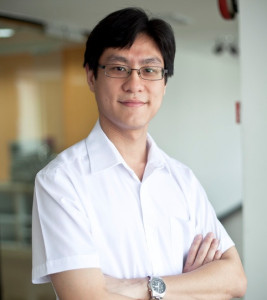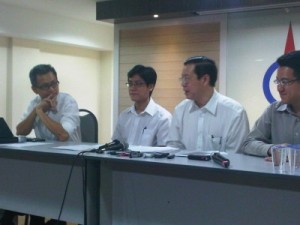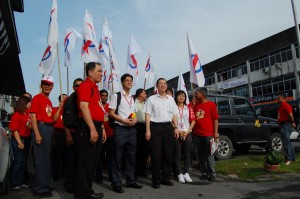 The 2008 elections cut through the fear and apathy that trapped many of Malaysia’s youth, invigorating them to stand up and be counted for the future of their country. One such young man bears a powerful legacy of putting Malaysia first and has entered the challenging world of opposition politics to foster a new Malaysia.
The 2008 elections cut through the fear and apathy that trapped many of Malaysia’s youth, invigorating them to stand up and be counted for the future of their country. One such young man bears a powerful legacy of putting Malaysia first and has entered the challenging world of opposition politics to foster a new Malaysia.
Age: 29
Education: MA International Studies & Diplomacy, School of Oriental & African Studies, University of London, BA Information System Engineering.
Previous work: CEO (Chocolate Eating Officer) of Chocolab, a chocolate maker
Hobbies: Cooking, Football, Tennis
Tell us about on your new appointment and what it entails.
My job as Lim Guan Eng’s political secretary based in Kuala Lumpur basically means that I am the Secretary General’s representative in KL because he does not have one for KL. He has a political secretary in Penang for his duties as a Chief Minister but that is a state government position.
So this role which I have taken has been vacant all this while. My duties involve meeting with people on his behalf when he is otherwise engaged or away from KL as well as liaising with the other Pakatan Rakyat party leaders in terms of representing him.
Why did you want to enter the political arena and what made you choose DAP?
I have always been interested in politics. When I was younger, it was just a general interest but I was always aware of what was going on in the country. I found politicians fascinating because their decisions affect everyone else.
As my father was a politician for many years (the late Tan Sri Khir Johari, former Education Minister who served under three Prime Ministers), that gave me a background that furthered my interest because I had a lot of exposure to politics. I listened in on many of the political conversations my father had with his friends.
On my own, I saw the many injustices that were taking place in the country. People are murdered and no action is taken to hold anyone accountable so how could there be accountability for financial and economical matters? It does not look like things are going to change for the better anytime soon despite the March 2008 elections, which could be seen as a lesson for the government.
But have they learnt? They have just awarded a RM36 billion project (the construction of the Mass Rail Transit or MRT) by direct negotiation! So it is clear that they have learned nothing, and the fact is that if we continue down this path, we will reach a stage where our country will be past the point of no return. This is about more than just the economy; it involves our institutions and our rights as people as well. It has all been eroded and compromised – our judiciary, our electoral system, the police, the MACC – nothing is independent anymore. It is like a horror story.
So as a conscientious youth who is idealistic, I feel like the country still has hope and I want to be a part of this hope and that is why I got involved.
As to why DAP, it is very simple. It was early in 2010 when I first considered entering politics and I went to see my dad’s old friends to get their advice on my options in terms of politics. One piece of advice which I received consistently was to go to the ground and see the true situation there. I’m from Penang, so I went there and spoke to my friends there – some of whom are from PKR and DAP. I attended their various functions and met their leaders and it so happened that I cultivated a friendship with Liew Chin Tong (MP for Bukit Bendera) and I also felt that the leadership of DAP was very exemplary, particularly in terms of how it runs Penang. So I feel comfortable working with them.
I strongly feel that the federal government can learn from the way Penang is run, in terms of following international best practices and being free of corruption. The state government has also managed to clean Penang up physically as well, and all this was achieved with the same council staff as before. The CM likes to say that he did not change the staff; he simply made them more efficient. So it can be done because Penang is cleaner and safer – it had a 27 percent drop in crime last year which is the highest in Malaysia. It is also much more prosperous now with 36 percent of the entire country’s FDI going to Penang in 2010, despite the fact that Penang only forms six percent of the nation’s population. So there is a lot of money going into Penang and that’s why things are moving in the state.
There is no magic formula here. The CM has basically just gotten rid of corruption and created an environment that is good for business – it is rules-based, efficient and industry-driven. Imagine if the whole country was like that! So I do feel that a little bit of Penang can be brought to the rest of Malaysia and this belief in the DAP leadership in Penang has spurred me to choose DAP as well.
What influence did your late father, a highly respected government leader, have on your political views?
My discussions with him were quite general and focused on national issues. We never discussed specific party-based issues. However, he and other UMNO leaders from his generation were very disenchanted with the goings-on of the Mahathir era. As I have stated, I am certain that if my father living today, he would never join the present day UMNO. It would go against every principle he believed in.
When my father joined UMNO it was a grassroots party, most of the members were teachers, my father was a teacher himself. Today many of its leaders just use the party as a means of making money and to secure lucrative government contracts. The leaders are self-serving and they use inflammatory racial and religious rhetoric to galvanise their supporters. I feel the future of Malaysian politics should be focused less on race and more on issues.
Tengku Razaleigh once said that when the founding fathers first set up the coalition in the late fifties, they had inherited a country that was already divided and segregated. They did the best that they could in terms of cooperation but it was not meant to be a permanent solution. We must come to a point – and it has already been three generations and 50 years since – whereby we can be more inclusive.
There should be a distinctive Malaysian identity which is missing and who else can we blame it on because there’s only been one party ruling the country in these 50 years. So they must accept responsibility that they failed to cultivate a Malaysian identity and I think they will not be able to even today. They may try to with slogans like 1Malaysia but it is all just rhetoric and as much as I think Prime Minister Najib Razak has some decent ideas, he talks about liberalising the economy and then he awards a contract of RM36 billion for the poorly-planned MRT project to an UMNO-linked company. So I really believe the BN system is beyond repair and that we need a new system. I’m not saying that we want to rule the country for the next 50 years – rather, let’s establish a two-coalition system for checks and balances.
So if the people have the maturity to vote PR in during the next elections, they will also realise that they have the power to elect the government which means that if someone doesn’t perform, then the people have the right to kick that person out, and we have to be wary of that. Once we achieve this, we will have a functioning democracy where the elected representatives do not become too comfortable and do whatever they want – this is what we want to avoid because it is rampant now.
Even though you only recently joined the party, you have already created quite a sensation. Why do you think it is and how does it affect you?
It’s definitely the legacy of my father’s name which creates an impact simply because he was an UMNO leader and I joined the opposition. I guess there is a novelty here because I chose a different group but again, I must point out that he was in the old UMNO and it’s completely different from today’s UMNO because my father always felt strongly about doing what is right.
I’m similar to him in this regard and my decisions are based on my sense of what is right and wrong. I feel that I have chosen the right side. The other issue at play here is race, which is always an important issue in Malaysia. It is unfortunate that it is such a political issue as well, because although of course race is an important part of our identities, I also feel that it should not be as politically relevant as it is now. Of course there are racial issue which need to be addressed but these are peripheral issues. The main focus should be on the economy, policies, democracy, equality and so on.
I very much want to see Malaysia move towards a less racial approach to politics. Again, this will never happen under BN; that is where their base of support is and they are racial parties. So it can only be done with a new generation of politics and political leaders such as through DAP. It is only in the opposition that you see young leaders.
What are the issues that you hold dear and most want to see reforms for?
 There are many things which need to be addressed but chief on my list are education reform as well as electoral and judicial reform. These are three crucial areas to fix immediately. With education, it moulds the minds of our young who are the future of the country. Electoral reforms to issues such as postal voting would secure our rights to choose the government that we want.
There are many things which need to be addressed but chief on my list are education reform as well as electoral and judicial reform. These are three crucial areas to fix immediately. With education, it moulds the minds of our young who are the future of the country. Electoral reforms to issues such as postal voting would secure our rights to choose the government that we want.
Judicial reform is also urgently needed because everyone has the right to a fair trial and we would like to see a country whereby if you commit a crime, you get an actual trial with a clear judgment. (bursts into ironic laughter) Isn’t it sad that we have to ask for things which are so basic to the fundamental tenets of democracy! It’s crazy that people get killed and nothing happens.
What are some hopes that you have for the party’s future?
DAP should start promoting itself and thinking of itself more of a federal government-in-waiting and focus on its results in Penang and Selangor. Simultaneously, those in the two states that DAP governs should focus on running a government properly and prove to the people that we can manage a government properly.
I say this because there is an obvious fear and anxiety in people at the thought of voting for something that they are unfamiliar with. As the saying goes, “Better the devil you know than the devil you don’t,” and this is very relevant because when we want to vote for change, we are also scared because change could be just as easily for the worst as for the best. So before you cast that ballot for change, you still have to ask yourself it is for the better or not. We might say that it can never get worse, but in reality, it always can.
So in order to give people some comfort, we must be able to convince them by running the governments that are under our control in an efficient manner. Moreover, we must ensure that the people here about this. The focus should be on projecting ourselves as the government-to-be which I feel the party is not adequately doing at the moment. So we should move in that direction. -The Rocket




